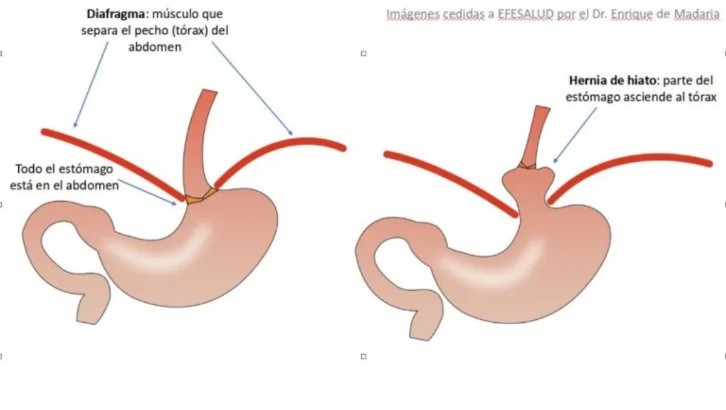
When the muscular ring of the lower sphincter of the esophagus does not seal the entrance to the stomach bag well, the digestive content, made up of nutrients, pepsin and acids, can leak out, even regurgitate up the throat, causing discomfort, heartburn, burning and stomach ailments. gastroesophageal reflux
“If the liquid reaches the respiratory tract, it will generate a cough, it can inflame the throat or trigger asthma attacks. If this esophageal reflux were outstanding, it would cause pneumonia”, says Dr. Enrique de Madaria Pascual, gastroenterologist at the General University Hospital of Alicante “Doctor Balmis”.
Heartburn or heartburn is one of the symptoms that indicates a malfunction of the digestive system. The esophagus is a kind of gutter made of squamous cell connective tissue covered with powerful facilitating muscles through which saliva, as well as the solid and liquid foods that we swallow, slide down to the stomach, with the help of mucosa.
This tube begins at the level of the neck, descends through the chest, and ends in the upper abdomen, where the lower esophageal sphincter opens, connecting it to the stomach pouch.
"The walls of the stomach can be significantly distended: in most cases, it can hold a liter of food and drink, but if it were necessary to force its capacity, it could contain a volume of up to four liters."

Explains the also president of the Spanish Society of Gastroenterology
“In the stomach there is a great deal of activity, unlike the esophagus. A liquid is secreted that contains enzymes – pepsin – and hydrochloric acid (produced by the gastric glands located in its internal wall); and the true phase of digestion begins”, he highlights.
Pepsin, a protein specialized in precisely digesting dietary proteins, is activated by acid; and thus, foods such as meat or milk are broken into small fragments, until they break down into their most essential parts or molecules.
In addition, this combination of acid and pepsin manages to eliminate the microorganisms that we can always find in everything that enters the stomach, including bacteria, such as Helicobacter pylori.
Dr. De Madaria explains the causes of gastroesophageal reflux
How is it possible that hydrochloric acid and pepsin do not harm the inner tissue of the stomach itself?
The stomach is formed inside by a thick layer of mucosa, which covers, in turn, other layers: submucosa, muscle, subserosa and serosa or outer layer. The mucosal layer is made up of multiple folded membranes or invaginations that extend down to the gastric glands.
It is the mucosal layer that prevents cell self-destruction. The alteration or deterioration of the protective mucus can lead to damage, for example, a stomach ulcer (causing burning, also in the duodenum).
“On the other hand, the mucosa of the esophagus is sensitive to these gastric juices. Hence the importance of the lower sphincter of the esophagus, which protects it from stomach contents”, highlights Dr. Enrique de Madaria.
The lower esophageal sphincter opens or closes the possibility of gastroesophageal reflux
The sphincter, a very useful and powerful circular muscle, prevents gastric contents from rising when digestion is activated in the stomach, but relaxes for five or ten seconds when swallowing is complete and we swallow food or drink.
“Unfortunately, in many people the lower esophageal sphincter, which should always be contracted, unduly relaxes, to a lesser or greater extent, allowing stomach contents to pass into the esophagus. This is called gastroesophageal reflux.”
Dr. Enrique de Madaria Pascual
When this acid and pepsin damage the esophageal mucosa, burning occurs in the chest: “It is a very annoying sensation, as if something was burning us inside,” he describes.
"If the relaxation of the sphincter were important, it is not surprising that a large amount of gastric content manages to reach the throat, a particularly unpleasant symptom called regurgitation (vomiting)," he adds.
“When sleeping or lying down, even more so if dinner has been copious, it produces a cough if it reaches the respiratory tract. In some people, regurgitation even leads to throat inflammation or triggers asthma attacks. Also, it causes pneumonia (infection in the lungs)”, he completes.
alteration of the lower esophageal sphincter, causing reflux
Is acidity or heartburn normal… or not so much?
Much of the world’s population supports heartburn or heartburn when it is very occasional, but those people who suffer from it frequently or intensely enough to impair their quality of life say they suffer from gastroesophageal reflux disease (GERD).
"There are a number of factors that predispose to reflux: overweight and obesity, pregnancy, certain drugs (nitrates for angina pectoris, certain antidepressants) and the presence of hiatus hernia," he relates.
Likewise, certain foods relax this esophageal sphincter, facilitating reflux, as is the case with fats, chocolate, mint, caffeine, alcohol and smoking tobacco.
regurgitation of stomach contents down the esophageal tube
“Sporadic heartburn can be treated with an antacid, which neutralizes gastric juice from the stomach. If it is frequent, omeprazole or similar drugs (proton pump inhibitors) are administered that prevent acid from forming in the stomach, very effective in treating heartburn, "he advises.
“Patients taking this medication can consume anything, including foods that predispose to reflux. Those who are tormented by regurgitation, have problems with medication or it is ineffective in their case, we offer a surgery that strengthens the lower esophageal sphincter”.
Dr. Enrique de Madaria Pascual
Gastroesophageal reflux caused by hiatal hernia
Why does hiatal hernia cause gastroesophageal reflux?
The chest is separated from the abdomen by the diaphragm, a wide, flat and thin muscle, like a vault, whose main mission is to help breathing. The diaphragm, among other openings, is crossed by the esophageal tube, which joins the stomach as soon as it enters the upper abdomen.
When part of the stomach enters the chest, passing through that hole in the diaphragm, displacing and unbalancing the sphincter towards the upper part of the abdomen, we speak of a hiatal hernia.
“Small hiatus hernias are frequently diagnosed and, in general, their importance is based on the fact that they predispose to more possibilities of generating gastroesophageal reflux; even so, we can have this type of hernia and not suffer any symptoms”.
Dr. Enrique de Madaria Pascual
“If the hiatus hernia is significant, it can cause serious discomfort and, in rare cases, obstruct the stomach by twisting the herniated area in the chest, generating a kind of ball and causing intense pain”, illustrates Dr. de Madaria.
Minor hiatal hernias do not require treatment unless they cause reflux. Very large hernias, or those associated with discomfort or a type of reflux that does not respond well to medication, can be operated on.
Dr. Enrique de Madaria explains gastroesophageal reflux Tips to reduce heartburn or heartburn caused by reflux
“Lose weight if that is the case with a healthy and balanced diet, such as the Mediterranean, and raise the head of our bed to rest or sleep by raising the upper esophageal area, since this inclination reduces the pressure of the stomach on the sphincter”, he recommends. .
“Consume reduced amounts of food and drink in general, especially at dinner, especially if they contain sphincter relaxants (alcohol, coffee, chocolate, mint, fats, etc.)”, he adds.
"Regarding pharmacological treatments against reflux, such as omeprazole, it is important to say that people who suffer from this problem are not afraid to take them as long as their doctor considers it so", he points out.
“The dimes and the diretes in social networks about the side effects are not relevant. The medications are monitored by the specialist, and omeprazole, for example, is very safe and is administered chronically”, concludes Dr. Enrique de Madaria Pascual.